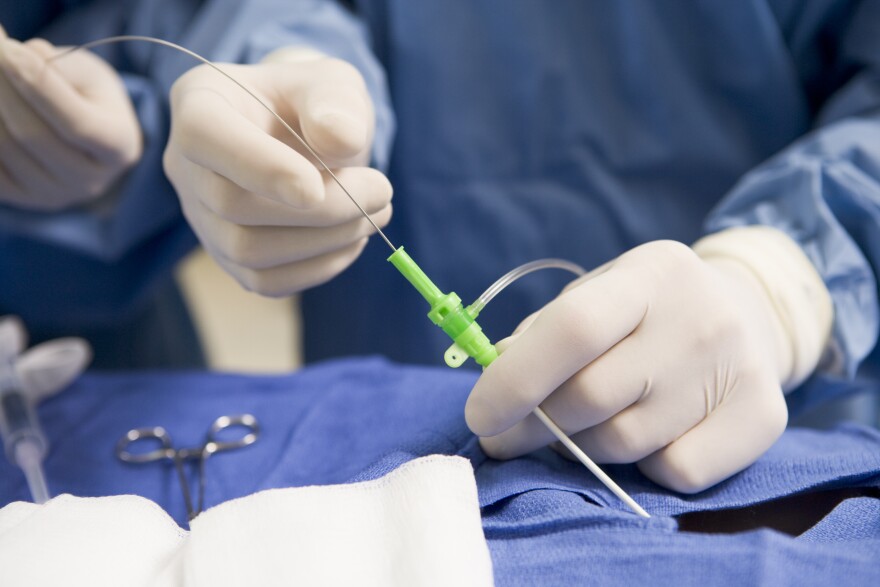After speaking on "Sound Medicine" in November, Dr. Sid Schwab returns to discuss what happens when well-done surgeries have bad outcomes and the challenges of fixing problems other surgeons leave behind.
Dr. Schwab is a semi-retired surgeon in Seattle who writes regularly about the art and craft of surgery.
Interview highlights
Q. How often does that happen... When a surgeon opens up the patient and then finds that the disease has progressed or the anatomy has changed. How often does that occur and what do you do?
A. It's a lot less common now a days then it used to be, because we have so much better imaging techniques now that it's fairly rare...When I was in training, we used to do exploratory laboratomies, where we felt like we had to go take a look to see what was going on. But, now a days, it's fairly rare that you get big surprises about what's going on... But there are still anatomic variations that you can't entirely anticipate. Sometimes despite the excellent imaging, you can find things are different than what you had expected.
Q. What can we do to prepare for surgery so that there are no bad outcomes?
A. The worst thing a patient can do to increase their risk of problems after surgery is smoke.
Q. Do you think surgeons are being prepared for these potential bad outcomes of surgery?
A. That's a huge part of what it takes to be a good doctor of any kind: Not only teaching you so that you know stuff, but also teaching you so that you know when you don't know stuff.
His recent blog post caught our attention. So we invited him to tell us the back story, and share part of what he wrote...
A. I have this recollection of having operated on a little baby. A situation called pyloric stenosis, it happens in newborns, where the muscle at the end of stomach has grown too fast. The stomach won't empty so they're vomiting. And the operation is very simple. You just sort of cut that muscle and it opens up. But there's a possibility of leaving a hole in the intestine when you do it; and you know about it, and make sure you don't, and if you happen to, then you put a little stitch in it and they're fine. But there's a danger of creating a hole in the intestine and not recognizing it. You know, and it's someone's 6-week-old baby; proud, happy, little parents and you're telling them that they need an operation. So, I had done it on one little baby and it was routine, and then I got a call about 2 in the morning saying that the baby had a fever and his abdomen was rigid, which can be a sign of infection. I wrote this thing, and I'll read a little bit:
“I’ll be right there,” I tell her, the words finding great resistance, barely squeezing out through my suddenly constricted throat. It’s easy to describe how I felt, because I feel that way again whenever I think about it. Had my wife awakened, she’d have seen me appear ghost-white, I’m certain. My stomach was hollow; my hands were ice. I could barely tie my shoes; my hands were shaking, and not following commands. It felt as if a cold hand were gripping my neck; I could hardly swallow. I splashed water on my face, made it to my car, raced to the hospital. As I drove, hands so tightly on the wheel that they were getting numb, I was thinking I’d do whatever was in my power to save the kid, do whatever it takes. Never leave him until it was over. And then I’d never, never, ever, ever do a pyloromyotomy again. And if he did poorly, I’d never operate again. This was a baby. Somebody’s precious baby.
As I headed to the pediatric floor, I entered the baby’s room, saw the nurse standing by, I felt as if a million eyes were on me, accusing and hateful. And there he was. Fussy face flushed with fever, but moving around like a baby, looking not so bad. His belly was soft as, well, a baby’s bottom. An x-ray looked fine.
I drove home nearly limp, still shaking, barely able to control the car, wrung out like a wet sock. I lay on the bed exhausted; relieved, but absolutely spent. An hour or so later, I dragged myself to work. And the next time a pediatrician called for a consult for a kid with pyloric stenosis, I took a deep breath, considered it carefully, and said, “I’ll be right there.”
You can follow Sid Schwab on Twitter at @SidSchwab.



